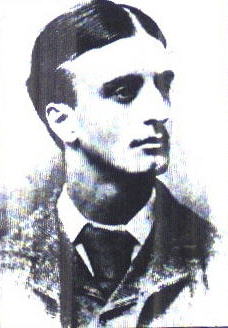 Montague John Druitt
Montague John Druitt Montague John Druitt
Montague John DruittMontague John Druitt (1857-89) was 31 at the time of the murders. He was the
son of a medical practitioner. Whilst at Winchester Shool he was heavily
involved in the debating society. He was a keen sportsman noted for his physical
strength. He graduated (badly) from New College, Oxford University with a degree
in Classics in 1880.
Immediately after graduation, Druitt began teaching at a boarding school in
Blackheath, London. In 1882, he started studying law and in 1885 started
practising as a barrister. He kept up his other job at the school, however,
since he enjoyed it so much.
In 1885 his father died; in July 1888 his mother went insane and was placed in a
mental asylum. succumbed to mental illness and was confined in Brook Asylum in
Clapton. Finally, in November 1888, he was dismissed from Blackheath School
after a mysterious scandal. On December 31, 1888 his body was found floating in
the Thames river. When his lodgings were searched a suicide note was found
reading: “Since Friday I felt I was going to be like mother, and the best thing
for me was to die."”
Mental illness seems to have run in the Druitt family. His mother had attempted
suicide before being placed in the mental asylum (where she died in 1890). Her
mother before her had committed suicide, and her sister had tried to kill
herself as well. Montague's oldest sister killed herself in old age by jumping
from an attic window.
The evidence that Druitt was the Ripper lies with a quote made by Inspector
Macnaghten, who referred to Druitt when he said:
“I have always held strong opinions regarding him…The truth, however, will never
be known, and did indeed, at one time lay at the bottom of the Thames…! From
private information I have little doubt that his own family suspected this man
of being the Whitechapel murderer; it was alleged that he was sexually insane”.
Dr. Dutton, the coroner in charge during the murders, complained in 1889 that
the police seemed to have lost interest in the murderer and was told 'The man in
question is dead. He was fished out of the Thames two months ago and it would
only cause pain to relatives if we said any more than that’.
On the other hand, Inspector Abberline rejected the idea that the Police were
convinced that the Ripper was dead by the end of 1888. In 1903 he said in a
newspaper interview that:
“It is simple nonsense to talk of the police having proof that the man is
dead…the authorities would have been only too glad to make an end of such a
mystery, if only for their own credit”.
Druitt’s appearance and his likeness to many witness accounts is evidence of
guilt. All but one witness gave estimate of age close to Druitt's (31) and said
that he had a moustache. Druitt was also of respectable appearance, always known
to have been well-dressed.
In terms of build, however, Druitt falls short. He was a slender man, while
witnesses described the man as being from medium to heavy build, stout, and
broad shouldered. Almost unfailingly, the suspect was labelled consistently as
"foreign-looking" and "a Jew."